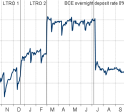The interbank market one year after Mario Draghi presidency at the ECB
By Urszula Szczerbowicz
Restoring the smooth functioning of the interbank markets was a key objective for Mario Draghi when he became president of the ECB. One year and two LTROs later, the ECB reached its target.




